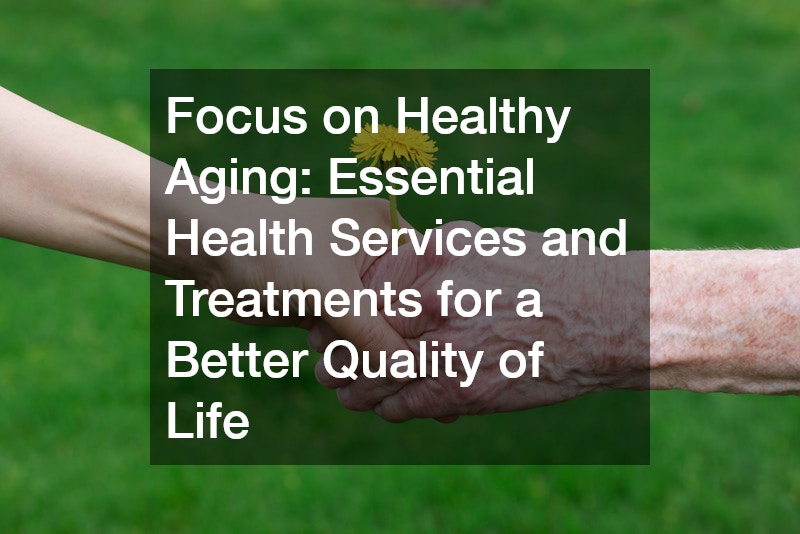Introduction
As the global population continues to age, the need to focus on healthy aging has never been greater. Healthy aging represents not only the absence of disease but the attainment of physical, mental, and social well-being. Aging impacts various aspects of life, from physical capabilities to mental health, and it calls for a comprehensive strategy that encompasses preventive care, timely medical interventions, and lifestyle adaptations.
It is essential to understand how aging affects the body and mind to proactively manage health. Proactive health management is crucial as it allows individuals to maintain independence and enjoy a higher quality of life. In this article, we will explore a range of health services and treatments that promote healthy aging, including chronic care management, vascular Medicare plans, dermatology care, and more.
By focusing on healthy aging, individuals can significantly enhance their well-being during their senior years. Through exploring essential health services and innovative treatments, this article aims to provide valuable insights and actionable advice to support healthy aging.
Understanding Healthy Aging
Healthy aging is about living a longer, healthier life while continuing to participate in activities that bring joy and fulfillment. It primarily focuses on maintaining physical, mental, and emotional health as we advance in years. The key principles of healthy aging include staying physically active, eating a balanced diet, and engaging in social activities.
Healthy aging is crucial because it allows seniors to maintain their independence and continue contributing to their communities. According to the World Health Organization, the number of people aged 60 years and older is expected to double by 2050. This statistic underscores the growing importance of implementing healthy aging strategies that accommodate an aging population.
Medical advancements and informed lifestyle choices play critical roles in supporting healthy aging. Innovations like chronic care management and new treatments offer hope and help seniors manage age-related conditions more effectively. Incorporating these strategies into daily life ensures an approach that supports independence and improves quality of life.
Chronic Care Management: Managing Long-Term Health Conditions
What Is Chronic Care Management and Why It Matters for Seniors
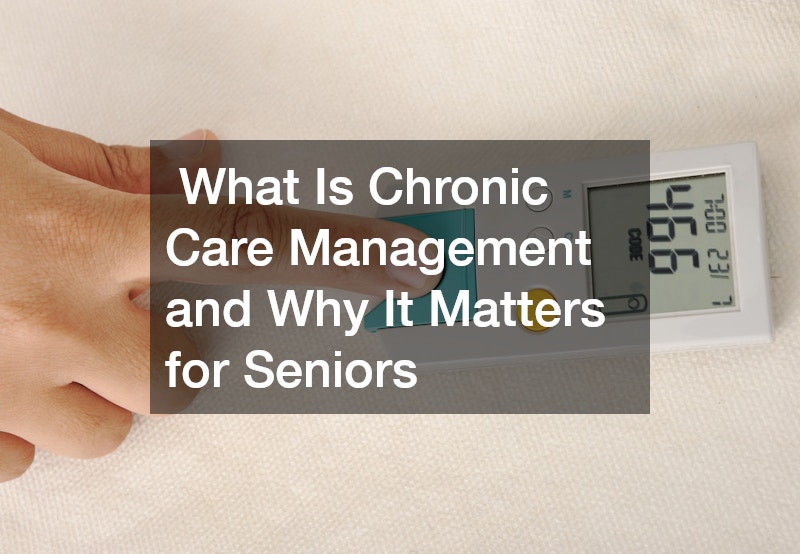
Chronic care management (CCM) refers to a care framework specifically designed for managing long-term health conditions common among seniors, such as diabetes, heart disease, or arthritis. This targeted approach matters immensely, as it helps older adults avoid complications associated with chronic diseases and leads to an improvement in their quality of life.
CCM involves personalized health plans and regular monitoring by healthcare providers. The main goal is to prevent hospitalizations by anticipating potential health issues before they escalate. Through cooperation with health professionals, seniors benefit from this holistic approach, ultimately reducing healthcare costs and improving their day-to-day living.
Proactive management, such as regular checkups and meticulous medication management, are key components of an effective management plan. These practices provide the foundational support necessary for maintaining health and optimizing life quality throughout one’s golden years.
Effective Strategies for Chronic Care Management
Proactivity is essential for successful chronic care management, and one effective strategy includes continuous coordination with healthcare providers. This ensures that any emerging health issues are promptly addressed and necessary adjustments to treatment plans are made.
Incorporating modern technology, such as remote monitoring tools, into daily care routines can also significantly enhance chronic care management. These tools allow both patients and providers to track vital signs and detect anomalies early, which can prevent hospitalization and ensure timely interventions.
Embracing lifestyle shifts, such as dietary changes and regular physical activity, is another crucial element of an effective management strategy. Combined with personalized healthcare plans, these modifications contribute to a healthier lifestyle that supports aging gracefully.
Vascular Medicare Plans: Enhancing Circulatory Health for Older Adults
Understanding Vascular Medicare Plans
As individuals age, vascular conditions such as varicose veins, poor circulation, and high blood pressure become more common. These problems can impact mobility and overall health, thus emphasizing the importance of maintaining good circulatory health for seniors.
Vascular Medicare plans provide a comprehensive solution to these issues by offering access to necessary treatments and management options. These plans assist individuals in attaining optimal vascular health through scheduled checkups, early detection screenings, and preventive measures.
Understanding and utilizing these Medicare plans is critical for seniors, as they provide the necessary medical support and resources to address vascular conditions, ultimately contributing to a better quality of life as we age.
Benefits of Vascular Care for Healthy Aging
Maintaining strong vascular health is vital for ensuring mobility and preserving independence. Good vascular health also supports cognitive function and energy levels, which are essential for active engagement in daily activities and hobbies.
Practical steps to enhance circulatory health include regular screenings, the use of compression stockings, and maintaining a heart-healthy diet. These preventative measures are important in minimizing the risk and impact of vascular-related ailments.
With approximately 80% of people aged 60 and older affected by some form of vascular disease, as noted by the American Heart Association, prioritizing vascular health through Medicare plans and preventative strategies is an essential aspect of focusing on healthy aging.
Dermatology Care: Protecting Skin Health as You Age
The Importance of Dermatology Care for Older Adults
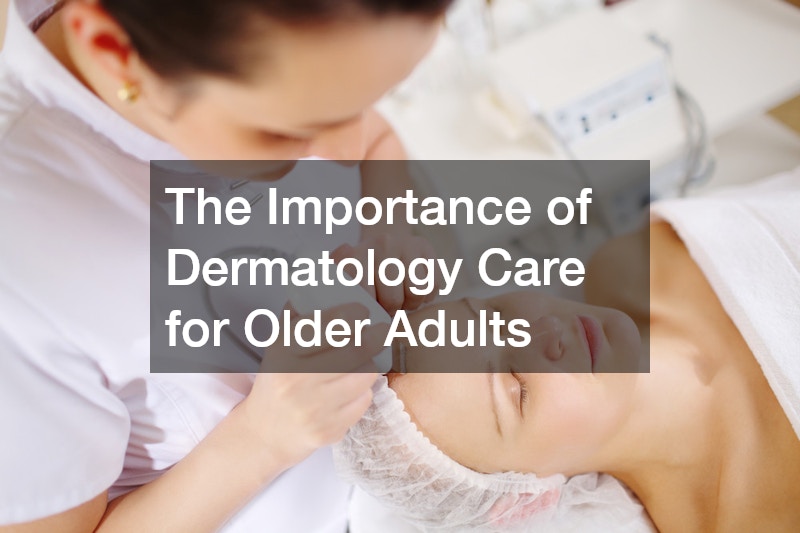
Aging brings about several changes to the skin, such as increased dryness, wrinkles, and the appearance of age spots. These changes highlight the importance of dermatology care to maintain skin health and appearance.
Skin cancer becomes more prevalent as we age, with early detection playing a critical role in successful treatment. Regular visits to dermatologists ensure that any unusual changes to the skin are examined promptly.
By making dermatology care part of routine health maintenance, older adults can address age-related skin issues effectively, enhancing both their physical appearance and overall well-being.
Treatments and Tips for Healthy Skin
Adopting a comprehensive skincare routine is vital for older adults. This includes the use of moisturizers, sun protection, and other topical treatments that maintain skin hydration and reduce damage from environmental factors.
Professional dermatology care offers options, such as skin tightening treatments, to manage sagging and wrinkles, providing non-invasive enhancements that rejuvenate the skin. These treatments can support individuals in achieving a more youthful appearance.
It is estimated that over 9,500 people are diagnosed daily with skin cancer in the U.S., according to the Skin Cancer Foundation. Therefore, protecting the skin through adequate care and lifestyle adaptations is essential for healthy aging.
Memory Care Facilities: Supporting Cognitive Health
Understanding Memory Care Facilities and Their Role in Healthy Aging
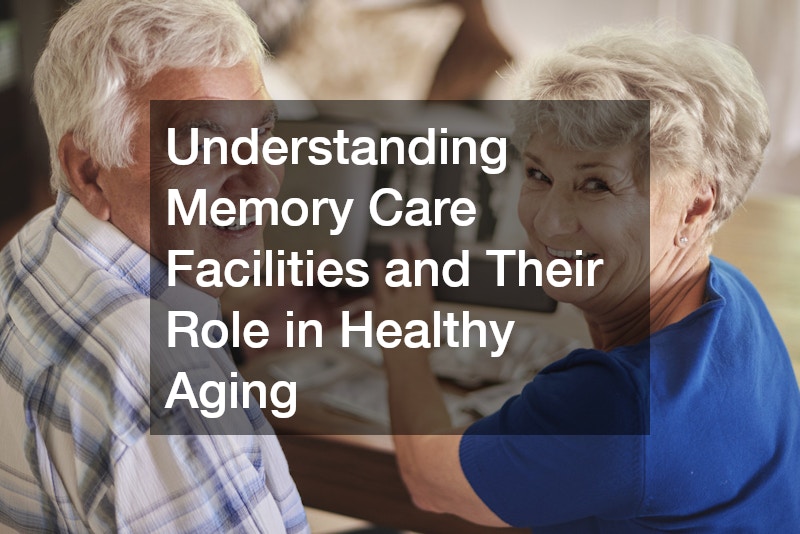
Memory care facilities provide specialized support to seniors experiencing cognitive decline due to conditions like Alzheimer’s disease. These institutions focus on creating safe and nurturing environments that address individual cognitive needs.
Such facilities are integral to maintaining dignity and quality of life for residents, offering tailored activities and therapies designed to engage the brain and slow cognitive deterioration. Effective memory care involves structured routines and a focus on emotional and social needs.
Family involvement is encouraged, ensuring that loved ones remain connected and actively participate in care planning. These collaborative efforts assure that seniors receive the most appropriate and compassionate care possible.
How Memory Care Facilities Contribute to Healthy Aging
Memory care facilities play an important role in healthy aging by assisting with daily activities and providing a sense of community for residents who might otherwise feel isolated. This structured setting helps to enhance cognitive function and emotional well-being.
These facilities offer activities and programs that stimulate the mind, promoting engagement and cognitive retention. They also help prevent the emotional and psychological impact of social withdrawal by encouraging interactions and a sense of belonging.
With 6.5 million Americans age 65 and older living with Alzheimer’s disease, as reported by the Alzheimer’s Association, taking advantage of memory care services becomes an essential part of maintaining quality of life and focusing on healthy aging.
Ketamine Treatments: A New Approach to Mental Health in Aging
Exploring Ketamine Treatments for Mental Health in Older Adults
Recently, ketamine treatments have emerged as a promising solution for treating depression, anxiety, and PTSD, particularly in older adults who may not respond well to traditional therapies. Early research suggests that ketamine may offer rapid relief for some patients.
These treatments have gained attention for their potential to alleviate symptoms quickly, making them a valuable resource for those in need of prompt mental health support. In contrast to conventional antidepressants, which might take weeks to show effects, ketamine can produce rapid changes.
The emerging research supporting ketamine’s efficacy in treating age-related mental health issues offers new hope for older adults, showcasing its potential role in supporting mental wellness and focusing on healthy aging.
The Role of Ketamine in Healthy Aging
For older adults exploring mental health treatment options, ketamine therapy offers a valuable addition to traditional methods. Its unique mechanism can improve quality of life for those resistant to typical antidepressant regimens.
Older adults considering ketamine treatments should consult with healthcare providers to weigh their options and determine the best course of action. This involves integrating therapeutic approaches that dovetail with ketamine’s effects for holistic care.
The Journal of Affective Disorders highlights studies showing ketamine’s potential for rapid relief in depression and anxiety among older adults. These findings contribute to a deeper understanding and implementation of mental health strategies focused on healthy aging.
Dental Care: Essential for Maintaining Overall Health
The Connection Between Oral Health and Aging
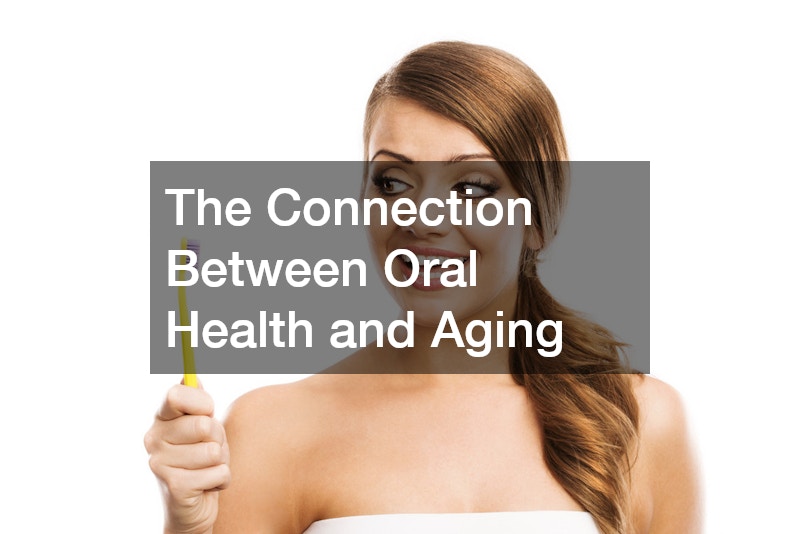
Oral health is an often-overlooked aspect of overall well-being, yet it plays a critical role, especially as we age. Dental care becomes increasingly important in maintaining health, as issues like gum disease can affect general body health.
Research shows that poor oral health can be connected to heart disease, diabetes, and other chronic conditions. For this reason, paying attention to dental hygiene and its implications is crucial for a healthy aging process.
By addressing oral health comprehensively, seniors can reduce the risk of other health problems, supporting longevity and enhancing life quality throughout their aging journey.
Tips for Maintaining Healthy Teeth and Gums into Old Age
Retaining healthy teeth and gums involves regular dental checkups, attentive daily oral care, and professional cleanings. By incorporating these elements into one’s routine, seniors can prevent periodontal diseases and associated health risks.
Proper brushing techniques, the use of dental aids like floss and mouth rinses, and prompt response to any dental concerns significantly lower the risk of oral health issues. These measures are pivotal in preventing oral diseases that are more prevalent in older age.
The American Dental Association notes that older adults with gum disease face increased risks of major systemic conditions. Prioritizing dental care supports a robust foundation for focusing on healthy aging.
Home Health Care Service: Staying Independent While Receiving Care
The Role of Home Health Care Services for Seniors
Home health care services foster independence for seniors by enabling them to receive necessary care within their own homes. These services can include nursing, physical therapy, and companionship, all tailored to individual needs.
This form of care supports older adults in maintaining their routines and lifestyle preferences while ensuring that medical care requirements are met. Staying in a familiar environment often contributes positively to emotional well-being, reducing anxiety associated with care facilities.
By leveraging home health care, seniors can experience both professional medical attention and the comfort of their personal space, enhancing quality of life through personalized and convenient support.
How to Access Home Health Care Services for Healthy Aging
Finding reputable home health care providers can be simplified by seeking recommendations from doctors, community resources, and family networks. This ensures quality care that aligns with one’s holistic health needs.
Early planning for long-term care is crucial for managing costs and availability of services. Understanding insurance options and potential out-of-pocket expenses helps individuals and families prepare for the future.
A survey by AARP notes that nearly 80% of seniors express the desire to remain in their homes as they age, utilizing home health care services to bolster this independence and focus on healthy aging.
Skin Tightening Treatments: A Non-Invasive Solution to Aging Skin
The Benefits of Skin Tightening Treatments for Older Adults
Skin tightening treatments offer non-invasive solutions to combat signs of aging like sagging and wrinkles. Techniques such as radiofrequency and ultrasound provide patients with alternatives to surgical procedures, promoting accessible skincare solutions.
These treatments stimulate collagen production, enhancing skin elasticity and firmness. They are particularly advantageous for older adults seeking rejuvenation without downtime typically associated with surgery.
The aversion to surgery and its extended recovery periods can be addressed through these non-invasive options, supporting individuals in maintaining youthful skin with minimal disruption to their daily routines.
Choosing the Right Skin Tightening Treatment for Healthy Aging
Selecting the most appropriate treatment involves research and consultations with dermatologists to assess what options align with personal goals and skin conditions. Tailored advice ensures that the chosen treatments meet specific needs.
Understanding different procedures’ effectiveness and potential risks guides informed decisions, fostering confidence in achieving desired outcomes. Collaborating with experienced professionals enhances results and satisfaction.
Grand View Research anticipates the global non-invasive skin tightening market will reach $10 billion by 2025. This projection demonstrates increasing confidence and interest in such procedures as part of focusing on healthy aging practices.
Tinnitus Treatment: Improving Quality of Life for Aging Ears
Understanding Tinnitus and Its Impact on Older Adults
Tinnitus—a condition characterized by ringing or noise perception in the ears—affects many seniors, impacting their quality of life. It can cause significant emotional distress, disrupting daily activities and interactions.
Understanding tinnitus starts with recognizing its commonality among older adults and the variety of its presentations. This awareness aids in better managing its impact on daily life and relationships.
The physical and emotional challenges associated with living with tinnitus necessitate effective management strategies. A comprehensive approach to treatment can facilitate improvement in both hearing capabilities and overall life satisfaction.
Exploring Treatment Options for ENT in Older Adults
ER Care: The Critical Role of Emergency Care in Aging Health
Emergency Room (ER) care is an essential component of the healthcare system, providing immediate treatment for individuals who experience sudden or severe health issues. As people age, the likelihood of needing emergency care increases due to the natural wear and tear on the body and the increased risk of chronic conditions. Whether due to an unexpected accident, heart attack, stroke, or respiratory distress, timely and effective ER care can significantly impact the outcome for older adults.
Understanding ER Care for Older Adults
For seniors, emergency care is not just about treating the immediate medical crisis; it also involves addressing the specific needs that come with aging. Older adults often have multiple health conditions, including heart disease, diabetes, high blood pressure, or mobility impairments, all of which can complicate treatment in an emergency setting. Additionally, the medications they take for these conditions can interact with the treatments administered in the ER, requiring extra attention from healthcare providers.
ER care for older adults is designed to stabilize patients and manage acute health problems. However, the challenges presented by aging, such as reduced immune function, slower recovery rates, and the need for specific medications, make it important for medical staff to be equipped with the knowledge and experience to handle geriatric emergencies.
Key Factors in ER Care for Older Adults
- Rapid Assessment and Treatment: When seniors enter the ER, quick assessment and treatment are crucial. Medical teams must assess the patient’s history, medications, and any pre-existing conditions to avoid complications. For example, if an older adult experiences chest pain, the medical team will prioritize ruling out a heart attack but also consider other possible causes like indigestion or a pulmonary issue.
- Specialized Care: Many hospitals now offer geriatric emergency departments (EDs), specifically designed to address the unique needs of older patients. These departments are staffed with providers trained in geriatric care, allowing for more personalized treatment in the ER setting. This includes special attention to pain management, fall risk reduction, and post-discharge care coordination.
- Careful Medication Management: Older adults often take multiple medications, increasing the risk of interactions or side effects during emergency treatment. ER staff must be mindful of these factors and adjust treatments as necessary to minimize risks.
- Post-ER Care: After initial treatment in the ER, seniors may require follow-up care, which could include home health services, rehabilitation, or referral to specialists. Timely follow-up is critical in ensuring a full recovery and preventing future emergency situations.
Actionable Advice for Seniors and Caregivers
- Know When to Seek ER Care: For seniors, recognizing when a situation requires a visit to the ER is key. Signs of severe chest pain, difficulty breathing, sudden weakness, or a fall should always prompt immediate medical attention.
- Maintain an Updated Medical History: Seniors and caregivers should keep an updated list of medications, allergies, and any chronic conditions to share with the ER team, speeding up the treatment process.
- Consider Geriatric Emergency Care: If possible, seek out hospitals with specialized geriatric emergency departments, where staff are trained to meet the specific needs of older adults.
Conclusion
Focusing on healthy aging is about embracing an active, engaged lifestyle that prioritizes comprehensive health maintenance. This pursuit involves understanding and utilizing the array of available treatments and services, such as chronic care management and tailored options like skin tightening treatments or tinnitus treatment in Singapore.
By exploring these essential services and staying informed about innovative medical interventions, seniors can significantly enhance their quality of life. Proactive steps taken today lay the foundation for a fulfilling and independent life as one ages.
Healthy aging is truly achievable with the right resources, care, and support. This article encourages readers to be assertive in investigating these possibilities, seeking professional guidance to navigate the evolving healthcare landscape, and ultimately bringing about an enriching aging experience for themselves and their loved ones.

